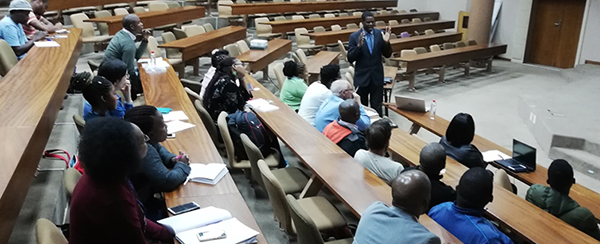College of Human Sciences
Leave the dungeon behind

Reverend Dr Fundiswa Kobo
Reverend Dr Fundiswa Kobo, from Unisa’s Department of Christian Spirituality, Church History and Missiology in the College of Human Sciences, recently delivered a talk on A spirituality of liberation: Spirituality of resistance, spirituality of protest in relation to gender-based violence (GBV). The talk was done virtually via a Women Impact Thursday group gathering of those from the Christian faith.
During the session, Kobo spoke about her background. She said that in her theologising, her starting point is her lived experiences of being a black woman. "I reflect from several locations. I was a rural girl who grew up in the village with my widowed maternal grandmother, and then I relocated to the township to stay with my unmarried mother."
"I am from a Christian family and I am an ordained minister who has journeyed with women, as well as an academic, researcher and scholar who is a minority in a male dominated space. I am also conscious of my own limitations as a person who cannot claim to speak on behalf of all women because of various factors."
She said that when she received the invitation to start a conversation on GBV with fellow women of God and Christians, she felt that it was important to bring it closer to home; therefore her talk on GBV was in relation to spirituality, covering aspects of prayer, the Bible, liturgy and faith, among others. "This is what I see, the oppression of women and GBV has been justified by scripture and church."
"As a womanist, it is my constant worry that we turn a blind eye to the oppression of women in the church and by the church, and that we do not see GBV in the church. I am concerned about how we read the Bible, how we look at the struggles for land dispossession, liberation of women, and so on, and how we look at systems of prayer and liturgy as Christians and as Africans in South Africa.”
A spirituality of protest
Kobo’s presentation focused on a reflection of an ongoing research on the liberation of black African women. Referencing a quote by Mmatshilo Motsei, she said: "Through an organised tyranny or religion, tradition, political, legal and economic systems, women’s minds have been constrained and their bodies violated without consent…This quote tells us that there are close affinities between an oppressed mind and a violated body."
She added: "Another important point is one by Mercy Oduyoye, the mother of African women’s theology, who suggested long ago that we ought to reflect on the liberation of the mentality that keeps women coping with marginalisation and repression rather than resisting and protesting."
In response to this, Kobo said that GBV is a reality and a problem of the 21st century in South Africa for theological discourse and the church. Yet the church has so many contradictions. "The Elmina Castle in Ghana is a space that I consistently reflect on as a womanist. It is an epitome of the dungeoning of black women’s bodies in the 16th century, which continues up to this day. There are dungeons in the 21st century. Women are not safe in townships, suburbs, villages, our homes or our churches."
She continued: "In this castle, the female dungeons are located below a Dutch Reformed Church. Women were brought to the courtyard, and the governor would select whom he found appealing and rape her. Some resisted, and they were put in chains, and not given food…The resistance, while knowing very well what the consequences were, is what I call a spirituality of protest."
Oppression justified theologically
Kobo said that it is not unusual for oppression to be justified theologically and using scripture to do so. "In our own South African context, the Bible was used to justify apartheid. There is ample evidence on theological justification of gender oppression, as evident in the example I just presented. The Elmina Castle example exposes the hypocrisy of the church. It’s a demonstration of how the church can allow itself to become the cultural guardian of the symbols of domination and subjugation - an apostasy to the mission of the church."
Another example of this is that there are pastors on trial for charges of rape, human trafficking and money laundering, amongst other things. Citing the example of Cheryl Zondi, Kobo said: "In her testimony in court aired on live television, Cheryl narrated how after being raped by Pastor Omotoso, he would pray for both of them. She states that she fears prayer. Which victim wouldn’t fear prayer, especially a woman whose body has been crushed and defiled and dungeoned? The same prayer that was used and left black Africans landless? What does prayer mean for women in the Elmina Castle, like Cheryl and the many other black women? I argue that it is resistance and protest."
Kobo said from a womanist perspective, prayer is related to life situations. Prayer is not abstract but something that is directed at the conditions of oppressions. "Some of our current situations are signs that something is also wrong in the church. And maybe what we need is women of faith who resist and protest against oppression. We can use the same resources, spirituality, prayer, the Bible, liturgy, and faith to liberate ourselves because no one is going to do it for us. We need women of faith who identify spaces of protest, women’s bodies as protest, women’s prayers as protest."
She said that Queen Vashti in the story of Esther in the Bible is a model that women could look at for a spirituality of resistance and protest. "Traditional women sometimes collude with the forces of patriarchy. Sometimes as women, we are our own enemies. Vashti is a woman who overcomes her patriarchal bondage within her culture by not colluding with it. When the king calls Vashti, he does not call upon her to appear before him and his drunken friends in her capacity as a queen. He calls her to appear in her capacity as a woman - a sexual object."
"Vashti knew that the king's objective in staging the banquet was to demonstrate his wealth, power, and authority. She was prepared to dismantle in an instant the king's entire carefully constructed façade by demonstrating to the world that she was a liberated woman. She does so with the conviction that her dignity is more important to her than the king’s display of his power. She simultaneously ensures her position as an individual and not as the object of the male gaze. She is in my opinion, a model that we could emulate in our quest for our own liberation."
* Compiled by Rivonia Naidu-Hoffmeester, Communications and Marketing Specialist, College of Human Sciences
Publish date: 2020/08/15


 Unisa co-hosts G20 community outreach in the Eastern Cape
Unisa co-hosts G20 community outreach in the Eastern Cape
 Unisans gain membership of prestigious science academies
Unisans gain membership of prestigious science academies
 Advocating for disability transformation through servant leadership
Advocating for disability transformation through servant leadership
 Unisa Press continues to illuminate the publishing space
Unisa Press continues to illuminate the publishing space